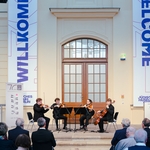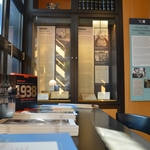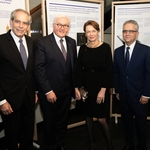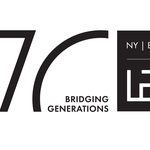"History Matters"
- Author
- Dr. William H. Weitzer
- Date
- Fri, Oct 1, 2021
Most of us know the story of the founding of the Leo Baeck Institute in 1955 by leading German-Jewish émigré intellectuals including Martin Buber, Max Grunewald, Hannah Arendt, and Robert Weltsch. They wanted to write the definitive history of the German-speaking Jewish community that was nearly destroyed in the Holocaust. It took a bit longer than they thought; the fourth volume of German-Jewish History in Modern Times was published in 1998.
In the intervening years, the effort to document that history resulted in LBI’s collections. Today, we maintain an archive with over 12,000 family collections, a library with over 80,000 books, and an art and objects collection with more than 8,000 pieces. Millions of images and pages from these collections are available to users anywhere in the world thanks to our digitization efforts.
These collections allow us to tell stories about the lives of German-speaking Jewish people that reflect their accomplishments, but also their resilience in the face of persecution. We must make sure that this history is never forgotten. However, our founders also knew that we must learn from the past.
I was reminded of this recently by a meaningful exchange with Kenyan officials and citizens who are working to memorialize the election violence in their country in 2007–2017. In a workshop coordinated by the Auschwitz Institute for the Prevention of Genocide and Mass Atrocities, my colleagues, Director of Berlin Operations Miriam Bistrovic and Project Manager Magda Wrobel, and I presented the work of the 1938Projekt. We shared how the project uses documents – letters, photographs, passports, maps, newspaper articles, and more – to educate a contemporary audience about atrocities from over 80 years ago, as well as our work to adapt the project for use by educators.
We knew we had something valuable to share with the group, but we also anticipated learning from them, and we were not disappointed. Their experience of violence and persecution is much more recent and emotionally charged. The Kenyans shared great sympathy for the plight of Jewish refugees in 1938 and connected it to their own experiences, while also noting the differences.
Our dialog with the Kenyans reinforced for me something that our founders knew – that history matters. LBI’s public projects and programs are essential to fulfilling our mission and making that point. We began to focus our programming efforts on the relevance of the history that we preserve in 2017 with a series of programs entitled, “German-Jewish History in the Now.” We deepened that work in 2018 with the 1938Projekt, and in 2021, the Shared History Project continues to make the past present. As we illuminate the lives of German-speaking Jews and their complex relationships with their neighbors over 1700 years of history, we are highlighting stories of migration, inclusion, exclusion, persecution, achievement, and resilience. Each of the objects and essays from the Shared History Project remind us not to forget history and to apply the lessons of history to today’s world, where similar opportunities and challenges are readily apparent.
From LBI News 112




